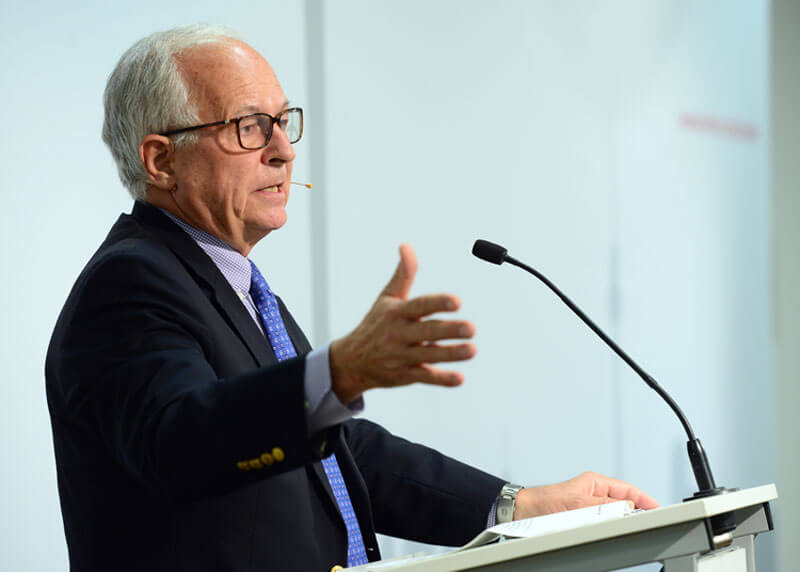
Defence and deterrence are only half the story, Wolfgang Ischinger tells journalists at Hertie School.
“The door to NATO must stay open” for Russia, German diplomat Wolfgang Ischinger told around 40 members of the international press Wednesday at a gathering at the Hertie School. It was vital that in addition to providing defence and deterrence, NATO’s 28 members also consider the alliance’s other remit, “cooperation and dialogue,” he said. Ischinger, who is Professor of Security Policy and Diplomatic Practice at the Hertie School, spoke to journalists ahead of the July 8-9 Summit of the North Atlantic Treaty Organization (NATO).
“It’s clear that this summit has one central theme,” Ischinger said. “How to deal with Russia.” NATO must strike the right balance between demonstrating its readiness to defend and reiterating its offer to work together, he said. Everything possible should be done to avoid playing into the hands of detractors. This would include arms control, strengthening the NATO-Russia Council, student exchange programmes, among others. “Russia has to respond and go through the open door, but we have to keep the door open,” Ischinger told journalists. Germany, in particular, has been a proponent of this dual defence-and-detente strategy since the 1960s when it was introduced to help ease tensions between East and West during the Cold War, he said.
In past years Russia attended such summits as a guest, Ischinger pointed out. He suggested that NATO could send a high-ranking official or representative from one of its members to brief the Russian government after its Warsaw summit . “We have nothing to hide. Instead, we want to be transparent and open with Moscow,” he said.
In order to avoid a renewed build-up of arms on both sides, “we need intelligence, restraint, composure and not a saddling up,” Ischinger said. “We have a great responsibility to be able to look back in a few years and say we did everything possible to prevent a new spiral of rearmament in Europe, by extending a credible offer to Russia that does not involve forcing it into a loss of face, but that can also be in its own interest.”
Nevertheless, he said, Poland, the three Baltic countries, and other NATO members have an “understandable additional security need,” resulting from Russia’s actions since the annexation of Crimea in 2014, and after the events in Georgia in 2008. They need “reassurance” and “deterrence.” Until now, NATO has reacted in a measured way to these threats and has not been in breach of the 1997 NATO-Russia Founding Act that laid out principles for cooperation, he said. That act was based on the idea that, over time, the cooperation and partnership with Russia would evolve – an aspiration that the events in the Ukraine have thwarted.
Thus, it is especially important that NATO doesn’t ignore the second pillar of its strategy. It is vital that the alliance clearly exhibits its “readiness to defend on the one hand, and a credible reiteration of its offer for cooperation, building trust and arms control.”
Germany is not isolated in this view within NATO, Ischinger said. “I think in principle there is consensus in the alliance about this. I don’t believe at all that Germany is alone in this,” he said. “I think we are historically, politically, militarily and strategically on the right track in general when it comes to the important question of how the best policy toward Russia should look.”
Ischinger would like to see more vibrant exchange between Russia and NATO countries, for example by expanding funding for students, researchers or professors. “The more exchange we have, the harder it will be for propagandists, especially those in Moscow who have nothing better to do than to poison our political debate, to spread their propaganda,” he said.
The new Centre for International Security Policy (CISP) will open its doors at the Hertie School in the autumn. Ischinger says he hopes that in addition to research, this will also be a relevant center for dialogue between practitioners – from government, foundations, the media and other think tanks.
Regarding the EU referendum in the UK, Ischinger said that from the viewpoint of security policy, it would be better if the UK stayed in the European Union. “I hope that this difficult crisis that the British leadership has created for its own country, that this, insofar as possible, is like a passing thunderstorm and does not do lasting damage.”
More about the author
-
Wolfgang Ischinger, Professor Emeritus of Security Policy and Diplomatic Practice | Founding Director, Centre for International Security
